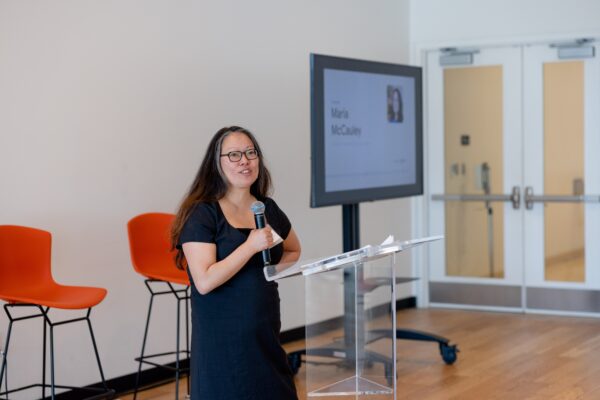PLA, Google Tackle Misinformation with New Information Literacy Effort

The Public Library Association (PLA) and Google announced a new joint effort to boost information literacy at the Martin Luther King Jr. Memorial Library in Washington, D.C. on April 4. PLA President Dr. Maria McCauley and Google Product Manager Nidhi Hebbar—along with policymakers, researchers, public library leaders, and NGOs—convened at the library for “Navigating the Noise: Tackling Misinformation with Information Literacy.” The event focused on emerging challenges and collaborative ways to address this growing challenge, with a particular focus on the role of libraries in this work. The program offered the following key takeaways:

PLA President Dr. Maria McCauley at “Navigating the Noise: Tackling Misinformation with Information Literacy.”
Misinformation is evolving. With information and resources available in more formats via more devices and applications, it is easier to create and spread misinformation online. Event participants took part in a brief exercise utilizing Google Search to assess the reliability of information online. The ensuing discussion highlighted the disparate knowledge of sources in the room, as well as the systemic ways in which some communities have been denied access to information.
User empowerment and education were identified as critical components to tackle misinformation. Libraries are at the forefront of this work and empower communities with valuable skills and tools to think critically about information. One participant noted, “Libraries battle on the front lines of information access and are essential to more informed and responsible citizens.” Because people can become defensive around the topic of misinformation, trusted intermediaries and digital skills building are vital to equipping people to search more effectively and think more critically.
Library professionals are particularly well placed to increase information literacy in today’s evolving technology landscape. As one of the speakers noted at the event, “Libraries are dedicated to information literacy, and we find ourselves in a unique proposition at the moment, to come together to provide structures of support for library workers and the public to tackle information literacy together. Libraries provide useful, reliable and life-changing information.”
Collaboration across sectors was a key theme. Combining information literacy frameworks like SIFT, online tools like Google’s About This Result and About This Page, and library staff expertise and programming can more comprehensively address evolving needs. Library workers build trust and essential partnerships with community members day in and day out in ways that help them understand and address unique information literacy challenges patrons face at a community level. Government and public-private sector partnerships with libraries are an effective strategy for extending reach into diverse communities. “Libraries can’t do this work alone, and it’s important to work together and build off the work libraries already do in terms of developing information literacy skills and tools.”
The forthcoming Super Searchers training and resources from PLA and Google will further equip library workers with skills and tools to help patrons critically engage with online information. The information literacy program was first launched last year with Public Libraries 2030 to train librarians across Europe. Given the success of this pilot, PLA and Google plan to expand the offering to U.S. and Canadian public library staff by fall 2023.
This collaboration will complement the information literacy work already happening in public libraries across the county and build upon the critical role libraries play as trusted hubs for no-cost access to information.
Combating misinformation will take strong partnerships and collaboration, education that meets people where they are, community empowerment, and ensuring equity and access are considered at every turn. As trusted spaces for community conversations and learning, libraries are critical players in the work to fight mis- and disinformation.
Learn more about this work at https://www.ala.org/pla/initiatives/informationliteracy.
Learn more about Google’s partnership announcement at https://blog.google/products/search/google-search-new-fact-checking-misinformation/.







